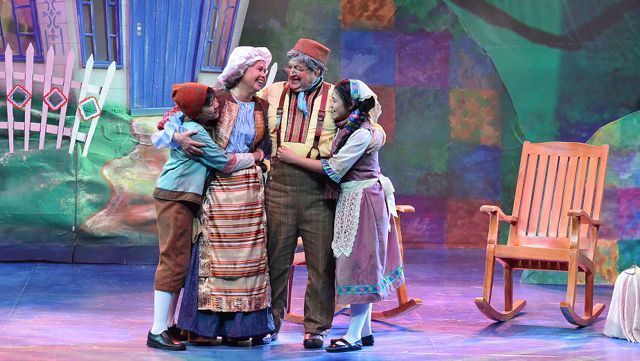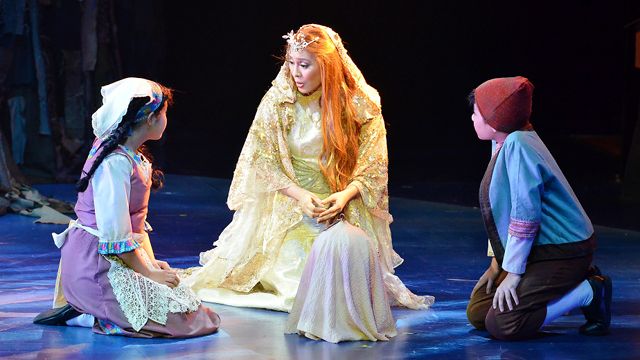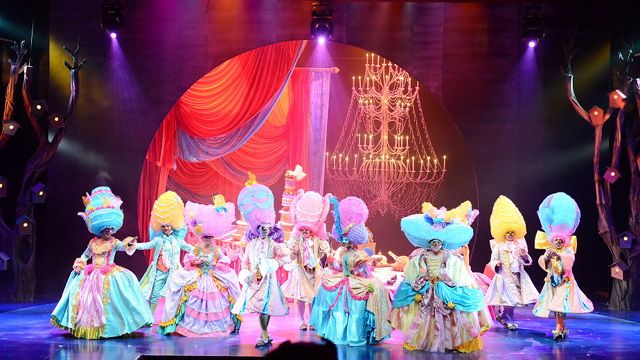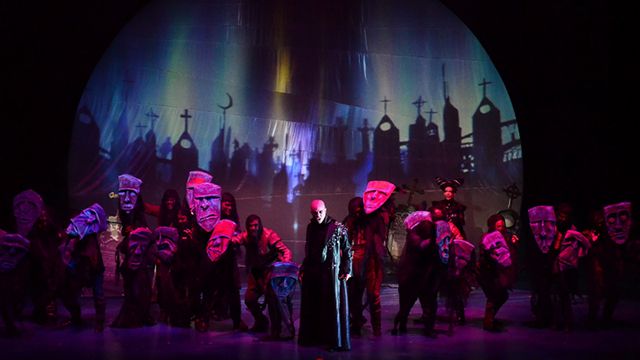SUMMARY
This is AI generated summarization, which may have errors. For context, always refer to the full article.

MANILA, Philippines – Trumpets’ “Bluebird of Happiness” is not just any staging of a classic story: it is no less than a world premiere of a new libretto by Jaime del Mundo. It also features a more exciting story tailored for today’s young audiences that brandishes all new songs with music by Rony Fortich and lyrics by Del Mundo.
The moral of the story authored by Belgian Maurice Maeterlinck in 1908 is this: sometimes we search far and wide, looking for what we don’t have, when all we need is right there all along. This message is all the more relevant in the 21st century when both children and their parents are overly consumerist and commercialized, their appetite for the latest gadget, fashion and food fads insatiable.
In the story, siblings Mytyl and Tyltyl, played by Alessa Zialcita and Chimmi Kohchet-Chua alternately with Anton Posadas and Guido Gatmaytan, bemoan their lack of gifts and décor on Christmas Eve to their pregnant Mama Tyl [Mayen Bustamante-Cadd].
The fairy Berylune [Jennifer Villegas-dela Cruz] pays a visit and tells them to search for the Bluebird of Happiness, the possession of which would solve their problems. To aid them in their quest, the fairy transforms their loyal dog Tylo [Robie Zialcita], their duplicitous cat Tylette [Lynn Sherman] and a lantern [Carla Guevarra-Laforteza] into persons to help them in their quest.

Along the way, they encounter their dearly departed Grandma Tyl [Joy Virata] and Grandpa Tyl [Steve Cadd], Father Time [Raymund Concepcion] and even their unborn baby brother. They must get past a forest of angry trees, the 7 deadly sins and the many traps and distractions that the sly Night [Joel Trinidad] and the treacherous Tylette have put along their path.
Besides reducing the number of characters, Del Mundo also adds a sense of urgency to their quest: they must find the Bluebird before dawn. He also makes Mytyl and Tyltyl’s quest more perilous and their nemesis Night and Tylette more villainous.
Props go to Mio Infante for the fantastic stage and costume design, and to John Battala for the lighting. The candy colored sets and costumes are a feast for the eyes.

Delicious wickedness
Often, it is the actors who play the roles of the villains who enjoy themselves and are most enjoyable to watch. “Bluebird of Happiness” proves this right once again. As in real life, being good and wholesome comes with many constraints.

Trinidad and Sherman, both young yet seasoned thespians, shine brightest by playing the shadowy characters. Watching them sing and dance the “Tango of Treachery” is truly a treat.
To clearly delineate their wickedness for very young audiences, both Trinidad and Sherman are garbed in black — an obvious choice for characters such as Night and Black Cat.
![TYLETTE. Lynn Sherman [left] as the duplicitous cat TYLETTE. Lynn Sherman [left] as the duplicitous cat](http://go.rappler.com/images/20131015-bluebird-DSC_8435-1.jpg)
Trinidad is in a cape and coat replete with an abundance of metal studs and bares a face that is deathly pale, cracked and caked. Sherman is in a corset and coiffure that take a page from the bride of Frankenstein. Those portraying the deadly sins are similarly dressed.
Clear morals
Like JRR Tolkien’s “Lord of the Rings” and CS Lewis’ “Chronicles of Narnia,” Maeterlinck’s highly symbolical “Bluebird of Happiness” extolls a European interpretation of Judeo-Christian virtues through, paradoxically, a story about magic.
Like Tolkien and Lewis, Maeterlinck’s fantasy borrows heavily from pre-Christian pagan European myths and legends. But while Tolkien and Lewis were published shortly after the global carnage of the Second World War and the dawn of the Atomic Age with its threat of nuclear holocaust, Maeterlinck’s fable was penned shortly before the First World War, when the horrors of global industrial age warfare on a continental scale was still unimaginable.
Hence, while Lewis and Tolkien’s tales feature truly villainous antagonists with lives hanging in the balance, Maeterlinck’s story simply idealizes the naivety and poverty of the simple folk.
Del Mundo, with his new book, highlights his values. A forest of angry trees admonishes the children to take better care of the environment. The souls of their dearly departed grandparents only rise from slumber when someone they love cares to remember them, reminding children to cherish their family. The 7 deadly sins fail to make them happy.
There is even a scene where they get to talk to the soul of their unborn baby brother — a clear “pro-life” message that the conception of the “unborn” is not to be prevented or planned regardless of poverty.

Then there is the Bluebird of Happiness that is to be found at their own home. This last and most precious moral applies to theater as well: the best plays may be homegrown, like the “Bluebird of Happiness.” – Rappler.com
‘Bluebird of Happiness’ runs for a final weekend at the Meralco Theater on Oct 19 [3pm and 8pm] and Oct 20 [3pm]. For ticket information, call Trumpets at 901-4364 or TicketWorld at 891-9999. For more details, visit The Bluebird – A Music by Trumpets on Facebook.
Add a comment
How does this make you feel?





There are no comments yet. Add your comment to start the conversation.